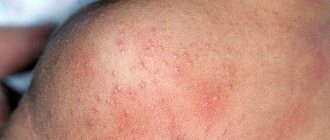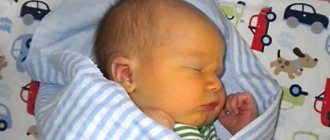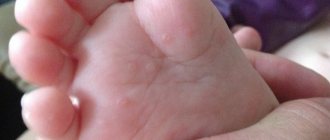Causes of snoring without snot in a child
So, let’s put aside the most obvious option – nasal congestion due to colds. In this case, you yourself probably know perfectly well how to get rid of it.
Chronic tonsillitis and/or adenoiditis
There is one fairly common cause of snoring in children - partial obstruction of the airways due to the growth (hyperplasia) of the palatine and nasopharyngeal tonsils.
Pathology can be observed against the background of previous infectious diseases:
Inflammation, which has become chronic, prevents the normal flow of air, especially in a horizontal position. Unfortunately, if the disease has gone too far, it can only be treated with surgery - removal of the tonsils.
Deviated nasal septum
The second pathological cause of snoring in a child is problems with the nasal septum, in which cartilage unevenly divides the nasal passage, leaving one side narrower than the other. It can also be treated surgically.
Overweight
In addition to the obvious problems (stress on the joints, diseases of the cardiovascular system, early diabetes mellitus, etc.), excess weight in a child provokes snoring, and in the long term - obstructive sleep apnea (OSA).
Malocclusion
Due to some malocclusions, in which the child's lower jaw moves slightly back, snoring at night is also possible. For the first time, you will need to purchase a special mouth guard and take your baby to the dentist. At an early age, it is easy to correct the bite.
Nasal polyps
Another fairly common phenomenon is the growth and thickening of the nasal mucosa and maxillary sinuses. The reasons are:
chronic inflammation of the mucous membrane (sinusitis);
in rare cases - cystic fibrosis (cystic fibrosis).
Nasal obstruction forces the child to constantly breathe through the mouth, however, in this case, snoring during sleep is only one of the signs of the disease. Breathing problems will also occur during the daytime.
We all know that adults snore, all of them, both men and women. Do children snore? Yes, a child can snore. And it should be noted that children's snoring is a very common phenomenon and occurs much more often than it seems.
First, let's figure out what snoring is and why the child began to snore.
Snoring is a rather unpleasant vibrating sound. When a child falls into deep sleep, all his muscles relax, including the muscles of the oral cavity. With very strong relaxation, the muscles of the soft palate under the tongue can block breathing. And when the baby inhales, the air flow meets this obstacle, so movements of the soft part of the larynx occur, and a characteristic sound appears. The strength of the sound depends on how much the airways are blocked; the more, the louder the child snores.
If a baby snores, this is not always a deviation from the norm. For example, for a very young child (up to 28 days of life), snoring is a completely normal process. At this age, they still have very narrow nasal passages; if their parents have not cleaned them properly, snoring may begin. You need to worry if at 1-2 months the child still continues to snore, and sometimes even with greater force.
What are the causes of snoring in a child?
There are actually quite a few of them. The most important causes of snoring in children:
- Anatomical feature of the structure of the child’s skull. For example, narrowed nasal passages, a defect of the nasal septum, defects and malformations of the jaw and palate (cleft palate).
- The state of the environment around. There may be accumulation of dust in the nasal passages, drying out of the nasal mucosa and the formation of a crust.
- A bacterial or viral infection that causes swelling of the mucous membranes and difficulty breathing (rhinitis and sinusitis).
- Enlarged adenoids. As a result of frequent viral diseases, active growth of nasopharyngeal tissue is observed.
- With excess weight, the fatty tissue of the soft palate increases, which also complicates the process of normal breathing.
- Growth of the thymus and thyroid glands. When they reach a certain size, they affect the tissue around them.
- Allergic swelling and inflammation of the mucous membrane.
- Bronchial asthma.
- Polyps in the nasal passages.
- Neurological diseases (for example, neuromuscular atrophy, Down syndrome).
Treatment of snoring
Sometimes you can help your child stop snoring on your own.
- First, try placing your head in a slightly elevated position while you sleep.
- Secondly, optimize external conditions, the room temperature should be 18-22 ° C and humidity 40-60%. Also remove all possible dust collectors: plush toys, carpeting, soft crib bumpers. Try to do wet cleaning as often as possible so that dust accumulates in a minimum amount.
- Thirdly, train the child’s muscles, do exercises with him that strengthen the nasopharynx, for example, inflate balloons, make vowel sounds, you can try practicing wind musical instruments.
- Fourthly, monitor snoring at night and during the day, when it manifests itself stronger or weaker than it is accompanied, and so on. If you notice that the intensity and frequency of your child’s snoring is increasing, contact a specialist as soon as possible.
Why is it necessary to help your baby stop snoring in his sleep?
The fact is that if a child snores while sleeping, he does not fully regain his strength. There is no complete air exchange in the body; not enough air enters the body. Subsequently, if you do not pay attention and deal with this problem in a timely manner, then there is a high probability of developing chronic hypoxia. This condition contributes to inhibition in the child’s development and affects brain and physical activity. The child may be hyperactive during the day, or vice versa lethargic and sleepy.
But even more dangerous consequences are caused by Apnea syndrome (temporary cessation of breathing). At this moment, the complete supply of oxygen stops and the concentration in the blood sharply decreases. The child has a very pale complexion, bruises under the eyes, etc.
Methods for diagnosing the causes of snoring during sleep
Before starting treatment, you first need to understand the cause of snoring in your child. As a rule, with this ailment people turn to an ENT specialist.
The doctor should order the following tests:
- Check the microflora in the nose and larynx;
- Complete blood count;
- Nasal endoscopy (during this procedure, you can take tissue for analysis and simultaneously remove the tumor);
- X-ray;
- Tomography;
- Study of snoring during sleep - polysomnography.
Depending on the results, consultation with an endocrinologist, allergist or surgeon may be required.
If adenoids are the cause of your child's snoring, there may be several treatment options. It is possible to use vasoconstrictor sprays and, in special cases, hormonal drugs. If there is no significant improvement, you should consider surgery. But as a rule, by the age of 10-12 years, the adenoids cease to be the cause of the child’s snoring.
When snoring is a consequence of allergies, antihistamines and hormonal drugs are used.
If the cause of inflammation of the nasopharynx is a virus or bacteria, then the first step is to identify the pathogen and then begin treatment.
Physiological defects of the jaw or nasal septum can only be corrected through surgery.
If asthma is the root cause of children's snoring, then the pulmonologist prescribes a regimen of bronchodilators, anti-inflammatory and hormonal drugs.
If you are overweight or have an enlarged thyroid gland, it is best to consult an endocrinologist to create an appropriate diet and control hormone production.
It is very important to understand that there is a possibility that a child began to snore as a result of several factors.
In this case, you need to contact several multidisciplinary specialists.
Therefore, you should be very careful and record any changes in the child’s breathing. If a child snores heavily at night, holds his breath, opens his mouth during sleep, behaves hyperactively during the day, or vice versa, there is decreased activity in behavior, do not rush to blame it on genes and heredity. This is a very serious reason to contact a specialist.
If a child constantly snores while sleeping, this can lead to a disruption in the rhythm of the day, since the baby will not be able to get enough sleep and does not get enough rest and recovery. After you cure this illness, you may need help in establishing proper, healthy sleep for your child.
We are ready to support you! We invite you to read the posts on the profile @sonmalysha.ru, and also to the live broadcasts at 11:00.
Author: Tatyana Kremneva.
Are some children predisposed to snoring?
Yes, this is possible. In addition to obesity, snoring without snot in a child can be caused by prematurity and some congenital diseases:
Craniofacial deformities (cleft lip or cleft palate);
Genetic abnormalities (for example, Down syndrome);
Neurological pathologies (cerebral palsy, muscular dystrophy);
Also, if your child snores and wakes up frequently, weak laryngeal muscles may be the culprit. This problem is often correlated with excess weight and poor muscle tone. In addition to diet, your doctor may recommend a number of special tongue training exercises that help strengthen your neck and throat.
How can you cure snoring in a child without snot?
The main goal of treatment, if a child constantly snores, is to return him to restful, healthy sleep. There are quite a few techniques. Of course, they will depend on the diagnosis. If the problem is in the tonsils or adenoids, surgery to remove them may be indicated. If it's just a matter of excess weight, your doctor may recommend diet and exercise.
In 90% of cases, these two problems are the cause, and children make a full recovery, says Dr. Hopkins.
Source
Treatment
If there is a crust in the nose or a runny nose, you can drip the nose with plain salt water.
Therapy is often aimed at eliminating the reasons why an infant suffers from snoring during sleep. For physiological factors, it is enough to turn the baby on his side. But you can’t always go to bed in one position. He should alternate sleeping on his left and right side. There is no need to place your palms under your cheeks.
The second natural factor is dried crusts in the nose. They appear due to regurgitation after feeding or previous rhinitis. They are removed with cotton swabs, after wetting the nose with saline or salt water. Take 1 – 2 teaspoons of salt per glass of warm water. Traditional methods advise using mother's breast milk. Nasal drops should not be used in newborns without a doctor's prescription.
Treatment measures are taken according to diagnoses:
- For runny nose and colds, nasal mucus is treated with the same salt water, but instilled. The nasal passage is cleaned with a rubber bulb, suctioning out the contents of the nose.
- In case of choanal atresia, the ENT specialist resorts to rhinoscopy and x-ray. The operation consists of puncturing the choanae, but it is more often performed after young patients reach 5 years of age.
- Enlarged adenoids are treated by a doctor by prescribing special medications. When selecting them, it is taken into account whether the pharynx is infected and whether there are complications such as otitis media.
- In case of malocclusion, for a baby or a child under one year old, parents give a bottle with a nipple with a narrow hole. This stimulates active sucking and the work of the jaw muscles. Children are taken to a pediatric dentist after 1 year of age.
- If your daughter or son snores and the day before there was a head injury, a fall or a blow to the face, consult a doctor. Traumatic deviated nasal septum requires medical intervention.
- If snoring in a newborn baby is caused by an allergic reaction, the pediatrician will prescribe antihistamines. They will relieve swelling and reduce the production of protective mucus.
Parents will have to make sure that the newborn wears clothes made of non-allergenic materials, they need to exclude downy and woolen toys, and review personal hygiene products such as soap, shampoo, and creams. Sometimes an allergy develops in response to a food product in a nursing mother’s diet, her personal care products, or medications.
Doctor Komarovsky about what to do if a child snores in his sleep
An adult snoring is, although an unpleasant phenomenon, but, by and large, quite common. Few of us are surprised if a fellow traveler on the train or a friend who came to visit for the night, after a certain amount of alcohol, snores profusely and persistently until the morning. But children's snoring is something completely incomprehensible. Therefore, parents who notice such a feature in their child often turn to the famous children's doctor and author of books on children's health, Evgeniy Komarovsky, who, in turn, tells what night snoring in a child can mean and whether it can be treated.
Preventive actions
The cause of childhood snoring and apnea is most often infectious and inflammatory diseases, so to prevent this phenomenon it is necessary to strengthen the immune system.
The child needs: proper nutrition; he should eat lean meat, fish, vegetables, fruits; You need to exclude (or limit) sweets, baked goods, and sweet carbonated drinks from your diet; daily walks in the fresh air; he must walk at least three hours a day in any weather; it is very important not to overheat or overcool him during walks - clothing should be appropriate for the weather; hardening procedures: cool shower, cool foot baths (there should be gradual adaptation to cool water); For older preschoolers and schoolchildren, sports are important; Swimming is especially beneficial for them
Snoring in children always indicates some kind of problem with the ENT organs or the central nervous system
Parents should pay attention to snoring and consult a doctor promptly. After the examination, the baby will be prescribed treatment that will relieve him of snoring and related complications.
Komarovsky about the causes of snoring
Evgeny Komarovsky notes that most often children snore for two reasons:
Adenoids
Accumulation of dried mucus in the respiratory tract.
There are other reasons, but they are much less common. Thus, snoring can be a consequence of a malocclusion; quite often children suffering from epilepsy, obesity (not overweight, but obesity), and children with certain pathologies of the respiratory organs snore in their sleep.
Snoring in infants
Quite often, parents of infants complain that their child snores in their sleep. Komarovsky urges not to confuse snoring and snoring. Babies sniffle not because of illness, but because they have a certain physiological distinctive feature - the nasal passages are very narrow from birth. Such snoring is not a pathology and does not require treatment.
However, it is necessary to help the child. Komarovsky advises creating sufficiently humidified air; if necessary, irrigating the nasopharynx with saline solutions.
Microclimate
If an older child snores, and he did not do this before, but at 2 or 3 years old he began to snore, you should start looking for the cause of the phenomenon by assessing the conditions in which the child sleeps. If a child breathes dusty, dry air, they put him to sleep in a room where there are a lot of “dust collectors” - carpets, soft toys, books, if wet cleaning and ventilation are done not every day, but once a week, there is nothing surprising, according to Komarovsky, in no snoring. In the respiratory tract, due to this microclimate, mucus dries out, which is produced by the body to protect against viruses and other harmful organisms. Dried mucus becomes a mechanical barrier to normal breathing at night during sleep.
When asked what to do, Komarovsky answers in some detail: ventilate, wash the floors more often and remove dust, remove all carpets, buy an air humidifier so that the child’s bedroom always has an air humidity of 50-70%, and an air temperature of no more 18-20 degrees. It makes sense to instill a saline solution into the nose, thus moisturizing the mucous membranes. For the same purpose, you need to give your child more to drink.
ENT diseases
Snoring can be a consequence of a sore throat; after this serious illness, swelling of the larynx persists for some time. This condition does not need correction, snoring will go away.
Such a sound night effect is possible after any respiratory disease in which the respiratory organs were affected.
Tonsillitis
The body has a sufficient number of “barriers” to resist viruses and bacteria and prevent them from entering the lungs and bronchi. The first line of defense is the tonsils. They are located in the nasopharynx and oral cavity, creating a kind of protective ring. The tonsils consist of lymphoid tissue and instantly respond to viruses and bacteria, trapping harmful microorganisms and destroying them. During the period of illness, the tonsils increase significantly in size, which can interfere with normal breathing.
The growing lymphoid tissue is no longer beneficial, but, on the contrary, is a source of disease.
Consequences of snoring
If children's snoring is ignored and the true cause of the disorder is not looked for, the consequences can be unpleasant.
Dried mucus in the oropharynx can cause chronic respiratory diseases in children, and neglected adenoids are very difficult to treat.
Snoring can lead to short-term disturbances in pulmonary breathing and respiratory arrest. This medical condition is called “sleep apnea” and can be deadly. According to statistics, such a complication develops in only 2-3% of children suffering from night snoring, but this possibility cannot be ignored.
Without exception, all children who snore sleep worse, and impaired sleep quality leads to nervous exhaustion, metabolic disorders and decreased concentration and learning ability.
Dr. Komarovsky will talk about the causes of children's snoring in the video below.
medical reviewer, psychosomatics specialist, mother of 4 children
Source
Apnea – respiratory arrest syndrome
All of the above reasons for children snoring at night, if you do not pay attention to them and do nothing, can lead to a very dangerous disease - obstructive sleep apnea syndrome. About three percent of children from 1 year to 14 - 15 years old suffer from this disease. Let's take a closer look at why it is so dangerous.
The child's relaxed muscles close all gaps for air passage and breathing stops. Stopping breathing can last up to a minute! The brain, deprived of oxygen, sends an alarm signal to the body, after which the muscles contract and breathing is restored. At the same time, the baby produces convulsive sighs and sobs, and wakes up in fear. With an advanced form of the disease, a child can wake up at night up to 300 - 600 times! What kind of vacation can we talk about? — The night turns into a nightmare.
Only parents can identify the first symptoms of the disease and begin treatment for this disease. Night symptoms are:
- regular loud snoring;
- sobbing and convulsive loud exhalations after holding your breath for a long time;
- sudden change in body position, sleeping in unusual positions;
- profuse sweating during sleep;
- enuresis;
- sleepwalking.
During the day, abnormal sleep makes itself felt with the following signs:
- hyperactivity
- inattention;
- constant headaches; high blood pressure;
- poor performance at school;
- retardation in physical development.
For children from one to 6 years of age, apnea does not bring as many troubles as for a school-age child. Poor behavior associated with hyperactivity; low academic performance during the school year due to inattention; ridicule from classmates; punishment of teachers; reproaches from parents; poor physical well-being is all a continuation of the nightmare of apnea. In this case, medical intervention cannot be avoided.
It is only important to make a correct diagnosis
To diagnose sleep apnea, polysomnography must be done. During this procedure, the state of the body is recorded during sleep, especially the amount of oxygen in the blood. Depending on its level, treatment is prescribed: the use of medications is combined with therapeutic exercises of the respiratory tract (singing, exercises for the larynx), and a special diet. Patient and persistent treatment will help the child get out of a very difficult situation for his age: obstructive sleep apnea syndrome.
Snoring in childhood can negatively affect the child's future life, so parents should show maximum love and patience and do everything to avoid its negative consequences.
5
User ratings
You can also give your ratings if you liked or disliked the article. Select the number of stars on the bottom line.
Dispatch
Why does a child snore in his sleep and what to do?
The snoring produced by adults does not raise as many questions as children's snoring. This phenomenon, in the understanding of most parents, does not fit in with the tender age of childhood, and therefore, with characteristic sounds from the children's bedroom, mothers and fathers have a lot of guesses about what is happening to the child. In this article we will tell you why children snore and what to do about it.
Let's sum it up
When trying to figure out why children snore in their sleep, you need to realize that even without apnea, snoring can become dangerous to their health. Under conditions of oxygen starvation, cells cannot fully develop, so there is no point in delaying the determination of the causes of this phenomenon. Sometimes you may need to visit several doctors. In any case, the problem cannot be ignored.
If you follow simple recommendations (establish an optimal diet and activity for your baby, monitor the cleanliness and humidity of the air in the room, sleep on the right pillow, control the progression of a cold), you can not only eliminate snoring and prevent its occurrence, but also teach your child to a healthy lifestyle .
Author: Yulia Zablotskaya
About children's snoring
Snoring in medicine refers to low-frequency sounds that become audible if there is some kind of obstruction in the respiratory organs that interferes with the normal free circulation of air during inhalation and exhalation. Usually the sound, which is difficult to confuse with something else, occurs due to vibration of the palatine septum. In a state of activity and wakefulness, it acts as a dividing wall between the respiratory and digestive organs. In sleep, when all the muscles relax, this partition also relaxes. It is this that performs the function of a mechanical barrier in most cases.
Children have an age-related peculiarity in the structure of their respiratory organs - they are very narrow and loose in infants and newborns. This is why small children make strange noises in their sleep.
However, they cannot be considered snoring; they are snoring. It should be treated as a physiological norm. Every second small child sniffles. Snoring cannot be considered the norm under any circumstances. Child snoring always has pathological causes, which is why it cannot be ignored and hope that the child will “outgrow” this problem. Another question is that these reasons can be easily eliminated or quite difficult to correct.
What are the dangers of night snoring?
The main danger of snoring is apnea, or short-term interruption of breathing during sleep. If you hold your breath, it provokes an insufficient supply of oxygen to the brain (an attack of hypoxia). The consequences of apnea are quite serious.
Growth in children slows down due to insufficient production of appropriate hormones. They are released just during night sleep. Heavy, restless sleep with frequent awakenings
The child does not receive proper rest, and both the brain and the entire body suffer from this. Poor sleep slows down the activity of the digestive organs, which leads to excessive obesity. Oxygen starvation is the cause of decreased mental development in children. Lack of sleep leads to constant fatigue, lethargy, apathy, and depressed mood. Development of bedwetting. Excessive sweating during sleep. Increased excitability, unjustified, causeless aggression, nervousness and whims. Distracted attention, the child has trouble concentrating, and has poor performance in school subjects.
Causes
The simplest reason for children's snoring is an uncomfortable sleeping position. If the baby throws his head back, the palatine septum may vibrate in a relaxed state due to gravity. To solve this problem, just put the child on his side and check if he is comfortable in bed.
Snoring can also occur due to nasal congestion. If a small child lives in a room where the parents carefully place a heater so that the child does not freeze, then too dry air quite quickly contributes to the drying out of the mucous membranes of the upper respiratory tract, which leads to nasal congestion. And the narrow nasal passages, which are also clogged with dried mucus, create that same mechanical barrier to free breathing. When a child sleeps, he begins to breathe through his mouth, this leads to vibration of the palatine muscle.
Some children from birth have individual structural features of the nasal passages and nasopharynx, which can lead to snoring.
Doctors often attribute such problems to age-related problems; as they grow, the airways also grow, change, become wider, straighter, and the problem is solved.
At this point, the harmless causes of children's snoring can be considered exhausted. If the child’s respiratory system is normal, the room is quite humid and not hot, the baby sleeps in a comfortable crib, on a hard orthopedic mattress, without a pillow, does not throw his head back, and snoring is still observed, then you will have to look for the cause together with the doctor.
Next, we will consider possible diseases.
Rhinitis
Most often, children snore at night due to problems with the nose. Rhinitis can be caused by colds, viruses, allergic reactions, and less commonly, bacterial infection. Characteristic night sounds in a dream do not begin with a runny nose; they usually mean that rhinitis has already become complicated.
With a viral infection, liquid snot usually appears at the initial stage, as with hypothermia. If the child was not given assistance correctly or not at all, the mucus may thicken and clog the nasal passages. It can also dry out due to excessively dry air in the room. With allergic rhinitis, the nose often becomes blocked without snot at all.
Impaired nasal breathing forces the baby to breathe through the mouth during sleep. As a result, the membranes of the oropharynx also dry out. Snoring caused by rhinitis is usually temporary and goes away immediately after the runny nose goes away.
Adenoiditis
The tonsils, which take on a large load, protecting the child from numerous viruses and bacteria that penetrate by airborne droplets, are subject to overgrowth. During the illness they increase in order to activate the forces of local immunity. But if a child gets sick often, then the tonsils simply do not have time to shrink and hypertrophy becomes pathological.
How to behave
If a child snores, this must be dealt with by all possible methods. First of all, it is worth checking whether the baby’s nose is breathing and, if the answer is negative, correct this situation. If the nose is breathing, the child is objectively healthy, but there is still snoring, it is recommended to seek advice from a specialist.
The doctor will be able to examine the child’s nose, as well as his oropharynx, in more detail and, if there are any pathologies there, will help to cope with them by prescribing the appropriate treatment. If no pathologies are found, the specialist will conduct a more detailed study to help the baby and decide what to do.
Parents, in turn, can provide the following assistance:
- It is worth teaching your baby to fall asleep on his side by placing a small cushion under his back at night, which will be able to correct his posture and will not allow him to lie on his back;
- It is imperative to assess the condition of the pillow and replace it with an orthopedic one; feather or overly large pillows are strictly prohibited;
- it is necessary to monitor the air in the room, keeping it cool and sufficiently humid; dry air and heat contribute to the development of snoring;
- if a child has trouble breathing through the nose, you should consult a doctor and start using drops that can constrict blood vessels (be careful, these drops cannot be used for a long time, but if they were prescribed by a doctor, there is no need to be afraid!);
- the room must be cleaned in a timely manner, including wiping the dust and re-arranging the bed linen, in order to prevent the appearance and active reproduction of dust and feather mites.
If general recommendations do not help to cope with the problem, you will need to contact your doctor again to prescribe treatment.
It is important for parents to remember that all medications are prescribed only by a specialist; you should not try to choose treatment for a child suffering from snoring on your own, so as not to aggravate the situation!
Although, if there are any drops, they are unlikely to do much harm, since the composition of most products is absolutely harmless. The doctor, depending on the complaints, may prescribe medications aimed directly at combating snoring, antimicrobial agents, vasoconstrictor drops, if necessary, to clear the nose. The parents’ task after this is to carefully monitor the child’s condition, follow the specialist’s recommendations and, again, seek advice from a doctor.
- Article rating
4.8
User ratings
You can also give your ratings if you liked or disliked the article. Select the number of stars on the bottom line.
Dispatch
Consequences
If you don’t deal with snoring, don’t look for its true cause and hope that with age everything will go away on its own, then negative changes in the child’s well-being will not take long to appear. The main problem will be that the disease that caused the child’s unpleasant nighttime “trills” will remain untreated and may even begin to progress.
A snoring child, although he himself practically cannot hear the sound he makes, sleeps shallowly. He may wake up many times during the night, although he himself may not remember this later. However, deterioration in sleep quality directly affects the child’s well-being during the daytime. Children who snore study worse, it is more difficult for them to concentrate, and they have problems memorizing poems and educational material. Chronic lack of sleep leads to the development of various chronic diseases and has a detrimental effect on the state of the nervous system of a growing organism.
Many hormones are produced in the body during sleep. If the baby does not fully rest at night, then the production of hormones is disrupted. This can slow down a child's development both physically and mentally.
It is most dangerous when periods of snoring coincide with age-related crises, which almost every child experiences. So, snoring at 3 years old, at 5-6 years old can provoke negative changes in the child’s behavior - isolation and aggressiveness will appear. Constant fatigue causes many failures, which are very painful for the child.
Children with chronic and prolonged snoring are more susceptible to developing cardiovascular diseases. Children who accompany their nighttime sleep with low-frequency rumbles are more likely to suffer from viral respiratory diseases more often and more severely. A healthy, sufficiently hydrated mucous membrane more effectively deters viral attacks during periods of mass disease. While the mucous membrane, which is dry from frequent mouth breathing, cannot adequately resist aggressive external influences, local immunity weakens, as a result, the child does not have time to recover before he again “catches” another infection.
Infrequently, only in 2-3% of cases, ordinary snoring develops into a real problem - sleep apnea , and this is a real risk for the child’s life, because spontaneous stops of breathing, of which there can be several hundred per night, lead not only to brain hypoxia with all resulting neurological problems, but also to the possible death of the child from suffocation.
Snoring can greatly complicate a child’s communication with peers, because at a certain age, summer health camps, hikes, and joint trips will begin, where friends will begin to point out to the child that he snores and does not allow others to sleep.
How to treat snoring after a runny nose
As mentioned above, snoring occurs during or after illness or acute respiratory viral infection. To determine the cause, parents need to take a close look at their snoring baby. If he sleeps with his mouth slightly open, sniffles, and at the same time he begins to make whistling sounds, then the reason lies in enlarged adenoids.
In this case, you need to contact an otolaryngologist. If the disease is not advanced, the doctor will prescribe local treatment using medications. Otherwise, surgery is indicated. The second is typical for highly overgrown tissue, which narrows and deforms the nasopharynx canal.
Chronic tonsillitis cannot be diagnosed independently in young children. A 1-month-old baby or a one-year-old baby does not speak yet, so parents are unable to notice the symptoms of tonsillitis - a sore mouth or dry mouth. If the child does not have a runny nose or a stuffy nose, but snoring continues to bother you, you should contact a pediatrician.
Treatment of this disease lasts more than one year: during this time, the fight against pathogenic microflora in the nasopharynx is carried out.
The therapy is complex and consists of rinsing the nasopharynx with antibiotics and using drugs aimed at increasing immunity. Treatment of tonsillitis occurs at least twice a year. When doctors do not achieve results in treatment, the inflamed tonsils are surgically removed.
If a child has had an acute respiratory viral infection or a cold, and after that you can visually distinguish the remains of snot in his nose, then he snores with his mouth open or makes wheezing sounds . In this case, it is recommended to rinse the nose with warm water or instill baby drops. If a runny nose persists for a short time after an illness, then there is no point in seeing a doctor.
How to help?
If you notice that your child is snoring, you should not immediately take him to the doctors. First, you need to carefully observe - at what time snoring begins, what can provoke it, and whether there are signs of the possible diseases listed above. First , you should tidy up the microclimate in the room where the child sleeps. The air temperature should not exceed 20-21 degrees, and the relative humidity should be in the range of 50-70%. Before going to bed, it is important to thoroughly ventilate the room.
The child's bed should be comfortable . It would be best to buy an orthopedic mattress and an orthopedic pillow for a snoring child, which eliminates the physical possibility of throwing his head up in his sleep.
What to do if snoring is caused by a cold
How to cure a child from snoring? If this trouble is caused by respiratory diseases in which the nose is stuffy, you can use the following methods to ease breathing:
- Rinse your nose with saline solution. If you can’t buy it at the pharmacy, you can prepare it yourself, the effect is no worse. Take a teaspoon of table salt and dissolve it in a glass of slightly heated water. Place 4-5 drops of the prepared solution into each nostril.
- After successful rinsing, it is recommended to use drops to constrict blood vessels, as well as some anti-inflammatory drugs.
- Replace the pillow with a more comfortable one or an orthopedic one. It is extremely undesirable for children to sleep on an “adult” high pillow.
- Turn the baby from his back to his side.
- Ventilate the children's room regularly and place a good natural air freshener in it. Doctors recommend using ionizers and humidifiers while sleeping. Anise, eucalyptus and peppermint essential oils have a beneficial effect on the respiratory system and also help to sleep soundly.
- Special aromatic patches are used to normalize breathing. They are usually attached to a pillow, mattress or children's pajamas. The results of clinical trials suggest that this method is absolutely safe. However, it can only be used from 2 years of age. These patches are very helpful if the child begins to snore in his sleep after suffering from a runny nose. In addition, they improve the child’s health and improve immunity.
Interesting methods for treating snoring
Experts do not recommend treating children's snoring with folk remedies. In most cases this is completely ineffective. Moreover, there are many rather interesting ways to treat snoring, which does not respond to any other therapy.
These methods include CPAP therapy. This is a method in which the lungs are artificially ventilated with constant positive pressure while you sleep. The inconvenience is that the device is equipped with a special nasal mask and a flexible tube through which a special compressor supplies oxygen. It is difficult to use at home. But a number of clinics in Russia offer such procedures, and their effectiveness is rated very highly. 2-3 weeks of such treatment are enough, and the problem with night snoring is solved safely.
Plastic surgery of the soft palate is another treatment method, albeit a rather radical one. Using a laser or cold exposure, some points on the soft palate are cauterized. They then predictably become inflamed, and as they heal, the area of the soft palate itself decreases, which reduces snoring.
It is interesting to use special electrical devices that record snoring and send a subtle electrical impulse to a person, as a result of which the child changes his body position and the snoring stops.
The most exotic way to stop your child from snoring is to buy him an Australian didgeridoo pipe. It is possible to extract sounds from it only with a special breathing technique, which perfectly trains the nasopharynx and larynx and strengthens the muscles of the respiratory organs. The snoring goes away pretty quickly.
What not to do when children snore:
- A big mistake for parents who notice that a child snores in his sleep is to immediately start waking him up. This does not solve the problem, but it greatly weakens the child’s already imperfect nervous system.
- You should not scare a child in his sleep, clap your hands over his ear, whistle and try to use other incredible folk ways to silence a snorer. If the baby wakes up at this moment, and this is quite likely, he may be very scared.
- You should not try to treat snoring with sleeping pills and sedatives. They relax the muscles even more, and the likelihood of sudden respiratory arrest increases significantly.
Prevention measures
Chronic respiratory diseases, which often provoke night snoring in children, do not arise out of the blue. They develop gradually, due to the fact that the child’s immunity is too weak. Having barely recovered from one infection, he “catch” a new one. Accordingly, the mucous membranes are almost constantly inflamed, and the adenoids begin to grow rapidly.
Therefore, the main preventive measure that needs to be taken in order for the baby to stop snoring at night is to strengthen the immune system, which must be done 24 hours a day, every day:
- Exercise is a mandatory element of the daily routine, which can only be excluded if the baby is sick.
- Walks should be done in any weather, except very windy and foggy, but the baby should be dressed in accordance with the temperature outside, avoiding hypothermia or overheating.
- The diet is moderate (obesity can also cause snoring!), with a sufficient amount of vitamins, minerals and plant fiber, which, like a brush, cleanses the baby’s intestines of waste and toxins.
- Breathing exercises can be performed even during illness and speed up recovery, and in a healthy child they increase the volume of the lungs, the elasticity of the soft tissues of the larynx and create an additional flow of oxygen.
- Communication – you cannot protect your child from contact with peers for fear that he will “catch” the new virus. The immune system must train, then, if necessary, it will cope with serious diseases, and not just a banal ARVI.
It’s time to consult a doctor when snoring accompanies your baby at night for 2-3 weeks in a row, or if it is accompanied by other symptoms of respiratory diseases: cough, runny nose, swelling of the mucous membranes, increased body temperature. A timely solution to this problem will save the child from many complications that may develop in the future.
Author: Anna Alexandrova











